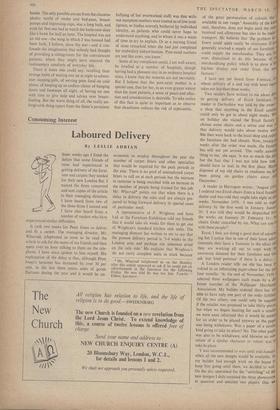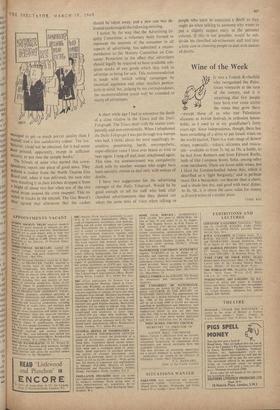Consuming Interest
Laboured Delivery
By LESLIE ADRIAN It took two weeks for Peter Jones to deliver and fit a carpet. The managing director, Mr. Wharrad, telephoned as soon as he read the article to ask for the name of my friends and then spent over an hour talking to them on the tele- phone. I have since spoken to him myself. His explanation of the delay is that, although Peter Jones's turnover has increased by over 30 per cent. in the last three years, sales of goods fluctuate during the year and it would be un- economic to employ throughout the year the number of - carpet fitters and other specialists that would be required for the peak periods in the year. There is no pool of unemployed carpet fitters to call on at such periods but the increase in turnover is being matched with an increase in the number of people being trained for this job. Mr. Wharrad* points out that when there is a delay in delivery the sales staff are always pre- pared to bring forward delivery in special cases of particular need.
A representative of F. Wrighton and Sons Ltd. at the Furniture Exhibition told my friends that it would take six weeks for them to get one of. Wrighton's standard kitchen sink units. The managing director has written to me to say that the present delivery period is '3-4 weeks in the London area and perhaps our salesman erred on the safe side.' He explains that Wrighton's 'do not carry complete units in stock because • Mr. Wharrad telephoned us on the Monday after this article appeared to ask if he could put an advertisement in the Spectator for the following Friday. He was told he was too late. Touche.— Editor, Spectator. of the great permutation of colours that available in our range.' Assembly of the kite unit, therefore, does not begin until the order received and allowance has also to be made f transport. He believes that 'the problem of livery could quite easily be overcome if st° generally stocked a supply of our furniture-- could supply the merchandise. They are, b° ever, disinclined to do this because of II merchandising policy which is to show a 61 kitchen display and order from the illa facturer.'
I have not yet heard from Formica, fr° whom delivery of a sink top with bowl insert' takes not less than three weeks.
Two readers have written to me about del3, in getting delivery of Ercol furniture. ° reader in Derbyshire was told by the owner a shop that anything in the 'Ercol catalog could only be got in about eight weeks. WI on holiday she visited the Ercol factory choose some chairs and a settee and was t that delivery would take about twelve weel She then went back to the local shop and orde the furniture she had chosen. Now,, twentY. weeks after the order was made, the furnit has still not yet arrived. 'The really anno thing to me,' she says, 'is not so much the del but the fact that I was not told how long should have to wait in the first place. HaY' disposed of my old, chairs in readiness we W' been sitting on garden chairs since ill December.'
A reader in Harrogate writes : 'August 1959' I ordered two Ercol chairs from .a local furnit dealer and was told they might take eight or ro weeks. November 1959: I was told to expel delivery by the first week in January. Januar! 26: I was told they would be dispatched frog the works on January 29. February 11: No chairs. Order cancelled by me. What can you d° with these people?'
Ercol, I find, are doing a good deal of advertise ing but I notice that in one of their latest advo tisements they have a footnote to the effect tbal they are working all out to cope with enormous demand for their furniture and they ask 'our kind patience' if there is a delay.
A London reader tells me she has been ir volved in an infuriating paper-chase for the Pid four months. 'At the end of November, 1959,1 selected three wallpapers each made by a tlif. ferent member of the Wallpaper Merchants Association. My builder ordered them but was able to have only one part of the order fulfilled' Of the two others, one could only be supplied if the retailer was prepared to take thirty pieces, but when we began hunting for such a retailer we were soon informed that it would be useless for an order to be placed anyway as the WO was being withdrawn. Was a paper of a similar kind going to take its place? No. The other paper was also to be withdrawn, and likewise no sub' stitute of a similar character or colour was to take its place.
'I was recommended to wait until mid-January when all the new designs would be available. As my builder had enough work on the house to keep him going until them, we decided to wait• On the day appointed for the "unveiling" of the new designs I duly revisited the three showrooms in question and selected two Papers. One We *Imaged to get--a much poorer quality than I Wanted, and a less satisfactory colour. The last, however, could' not be obtained, for it had never been printed, apparently, except in sufficient quantity to put into the sample books.' The friends of mine who started this corre- Vondence report one piece of good news. They ordered a cooker from the North Thames Gas Board and, when it was delivered, the men who Were installing it in their kitchen dropped it from a height of about two feet when one of the two illetal straps around the crate snapped. This re- sulted in cracks in the enamel. The Gas Board's Jitter agreed that afternoon that the cooker should be taken away, and a new one was de- livered (undamaged) the following morning.
I notice, by the way, that the Advertising in- quiry Committee, a voluntary body formed to represent the interests of the consumer in all aspects of advertising, has submitted a recom- mendation to the Molony Committee on Con- sumer Protection to the effect that advertisers should legally be required to have available ade- quate stocks of any goods which they wish to advertise as being for sale. This recommendation is made with 'switch selling' campaigns by electrical appliance and other retailers particu- larly in mind, but, judging by my correspondence, the recommendation could well be extended to nearly all advertisers.
A short while ago I had to announce the death of a close relative in the Times and the Daily Telegraph. The Times dealt with the matter com- petently and non-committally. When I telephoned the Daily Telegraph I was put through to a woman who had, I think, about the most appallingly in- sensitive, penetrating, harsh, unsympathetic, super-efficient voice I have ever heard or wish to hear again. I rang off and, later, telephoned again. This time, my announcement was competently dealt with by another woman who might have been specially chosen to deal only with notices of deaths.
I have two suggestions for the advertising manager of the Daily Telegraph. Would he be good enough to tell his staff who look after classified advertisements that they should not adopt the same tone of voice when talking to
people who want to announce a death as they might do when talking to someone who wants to put a slightly suspect entry in the personal column. If this is not possible, would he sub- divide his classified advertisement staff and take a little care in choosing people to deal with notices of deaths.



































 Previous page
Previous page